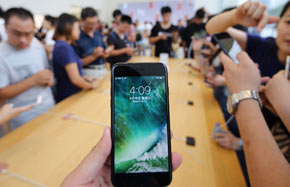QR codes making inroads into China
BEIJING - Zhang Xiaoning whips out her smartphone in front of a landscape print in the National Art Museum of China. But she doesn't want to take a picture -- instead, she uses her phone to scan a square printed with a mosaic of black dots next to the print.
Scanning the QR code, as it's called, gives her detailed information about the print's creator, as well as the artistic style that was used to create the print.
QR codes, a type of matrix barcode initially created for the Japanese auto industry in the 1990s, are now commonly seen in shopping malls, restaurants and subways across China. The codes have significantly greater storage capacity and readability than standard UPC bar codes, making them useful for a variety of applications.
Beijing Lingdong Kuaipai Information Technology Co was one of the first Chinese companies to develop QR code scanning software. The company was established in 2010, but its QR code business didn't start to take off until last year, according to CEO Wang Pengfei.
"The popularity of smartphones and the development of mobile internet services in China has provided a mature business ecosystem for QR codes. More people are becoming familiar with them," Wang said.
Tencent, a leading Internet and mobile phone service provider, launched its own QR code scanning service in 2012 via Wechat, a mobile phone-based text and voice messaging service that has over 200 million users.
With the service, users can scan codes printed on posters in restaurants, shopping malls and movie theaters in order to receive membership cards or coupons.
Ma Huateng, CEO of Tencent, said QR codes will be an important way for more companies to enter the mobile Internet market.
"More and more Internet giants, such as Alibaba and Baidu, are getting involved in the QR code business. Although this poses a threat to our market share to some extent, it has greatly accelerated the popularization of QR codes. More potential QR code users means more business opportunities," Wang said.
QR codes are not only a marketing tool for commercial use, but are also gradually entering the public sphere. It is not uncommon to see QR codes on business cards, postcards or social media sites. They have also seen use in sectors as disparate as public transportation, agriculture and catering.
Song Shaotang, a resident of the Daxing district of the city of Beijing, runs a company that sells packaged watermelons. Song prints QR codes on the melons' packaging that can tell consumers about the melons' producer, their quality classification and even whether fertilizer was used to grow them.
"The Daxing district is also promoting the usage of QR codes by integrating them into the its agricultural information service platform," Song said.























